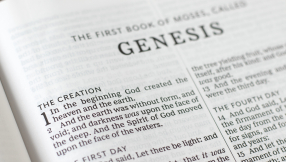
This year Lent begins on Ash Wednesday, 22 February, six and a half weeks before Easter, and provides a 40-day period for reflection, prayer and abstinence (Sundays are excluded), in imitation of Jesus fasting in the wilderness before he began his public ministry.
That word Lent reminded me with gratitude of things that I have been loaned over the years: cars, holiday homes, books. In fact, I inherited a number of books from my father-in-law, Michael Rees, when he was promoted to glory, which all bear inside the cover that very word Lent.
If you are lent something you have it and can use it, but it doesn't really belong to you, and eventually you, as borrower, must return what you have borrowed to the lender. And because you don't own what you have been lent, you are responsible – and ultimately accountable – for how you use it. As I pondered this, the thought struck me that the concept of 'being lent' applies to our lives in at least three ways.
First, our lives are lent to us.
I believe the biblical view is that we do not actually own or possess our lives; instead, we are lent them by God. We do not make ourselves; we are formed by God in our mother's womb effectively out of nothing. We come into the world with nothing and none of us can keep ourselves alive in our own strength. God, the giver of all life, breathes life into us on a daily basis. Our lives belong to God. We may acknowledge that we drive in a borrowed car and live in a house we don't own, but far more important is the truth that our very lives are on loan to us.
St Paul sums it up in 1 Corinthians 6:19-20: 'Don't you realise that your body is the temple of the Holy Spirit, who lives in you and was given to you by God? You do not belong to yourself, for God bought you with a high price. So you must honour God with your body' (NLT).
Second, the lives we are lent will one day be taken back by God.
Imagine you are lent something like a computer, a lawnmower or even a house. Sooner or later you will get the message from the owner, 'I must take back what I lent to you.' The loan is ended. This also applies to life. Sometimes, particularly with the elderly or the terminally ill, there is an awareness of the 'imminent cancellation of the leasehold of life'. But others find the recall by the owner of their lives to be unexpected and much earlier than hoped. Jesus told a parable of the complacent rich man who planned to build bigger barns and its sobering punchline: 'But God said to him, "You fool! This very night your life will be demanded from you"' (Luke 12:20 NIV).
In the solemn, brief and unforgettable words of the Book of Common Prayer, our existence is 'dust to dust, ashes to ashes'. One day our lives will be returned to the one who breathed life into them. They are lent.
Finally, we will all give account to God of the lives we have been lent.
When faced with criticism over some action, it's common for someone to protest, 'It's my life!' But no, none of us owns our life; we have only been lent it. I'm sure that, like me, you have returned a hired car and found yourself standing by uneasily as it is scrutinised for any scratches or dents you might have inflicted. In a similar way, we will all need to give an account of how we have used our life for God.
Many of Jesus' parables teach this principle of accountability, such as that of the talents in Matthew 25:14-30. Another is that of the wise manager in Luke 12:42-48 with its challenge, 'From everyone who has been given much, much will be demanded; and from the one who has been entrusted with much, much more will be asked' (NIV). And St Paul writes in 1 Corinthians 4:7, 'What do you have that you did not receive?' (NIV).
God is a gracious and loving God and offers us forgiveness in Christ, yet I think it's important that all of us ask ourselves what have we done with the life we have been lent?
This Lent you can focus on saying particular prayers, which is commendable, or on skipping chocolate, abstaining from social media or alcohol. But can I encourage you to prayerfully ponder, remembering that all we are and all we have has been lent to us and that we remain accountable to God? Are there attitudes and actions that need to change? Are we using the time, talents and treasure entrusted to us under God's management who owns us?
Or just do both – abstain and prayerfully ponder!
So when you see, or hear, the word Lent, remember what you have on loan from God.
Canon J.John is the Director of Philo Trust. Visit his website at www.canonjjohn.com or follow him on Facebook, Instagram or Twitter.













